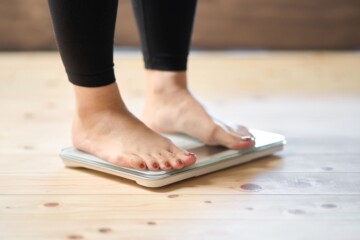It’s easy to understand why CAMs are so popular with PCOS patients and especially PCO patients with fertility issues. ‘Clean eating’, ‘meditation and mindfulness’ and ‘wild swimming’ all seem to fit with the zeitgeist so taking substances which are ‘natural’ or undergoing procedures that are associated with stress reduction and relaxation such as reflexology and acupuncture are considered preferable to ‘chemicals’ and surgical procedures. The sheer unpredictability of fertility treatment and its outcome, the time, the delays, the cost and the enormous emotional and psychological burden mean that fertility treatment has been rightly likened to treatment for cancer in terms of the emotional toll it inflicts. (4)
Polycystic ovary syndrome is a complex endocrine condition affecting women from puberty to post-menopause with a prevalence of 10–15%. PCOS is characterised by biochemical and clinical features of excess androgen levels such as hirsutism, alopecia and acne, menstrual irregularities and polycystic morphology of the ovaries. Women with PCOS have a higher prevalence of impaired glucose tolerance and insulin resistance, both risk factors for type 2 diabetes mellitus.
Young women with PCOS are hyper-aware of their fertility issues. They have often experienced a delayed and then disordered menarche with irregular periods associated with problems such as acne, hirsutism and weight gain. They may have been prescribed the OCP to help with menstrual irregularity and hyperandrogenism without being informed that the regular ‘pill’ periods that they experience are masking rather than curing their underlying condition. Disastrously, they have been told that they will find it difficult to get pregnant and this misinformation, associated with the poor self-image associated with weight issues, acne and hirsutism in the age of the ‘Selfie on Instagram’, often results in high-risk sexual behaviour and unwanted pregnancies in young women who believed they were ‘infertile’ and sought personal validation in a hyper-sexualised online teen culture.
Psychiatric morbidity presenting as low mood, depression and disordered eating (anorexia and/or bulimia) is relatively common in young women with PCOS, and is increased in those seeking pregnancy. (3) Obesity, as still somewhat irrationally defined by BMI, may deprive these women of effective treatment because their BMI is ‘too high’ for eligibility for fertility treatment (>30) and yet not ‘high enough’ (>35) for surgical intervention such as gastric banding or access to appetite suppressant injections such as semaglutide. These BMI- centred restrictions are recognised to be a rationing rather than an outcome-driven decision tool but they may lock a vulnerable group of women into a cycle of hopelessness and despair.
Although routine treatments for the anovulation associated with PCOS such as Myo-inositol, Metformin, Clomid, Letrozole, injected gonadotrophins and Laparoscopic ovarian diathermy (LOD) will achieve pregnancy for up to 50% of women with PCOS, many will still need to resort to ART, namely IVF.
Numerous publications report CAM usage rates of between 30 and 60% in patients undergoing IVF, the commonest being reflexology, herbal supplements and acupuncture. (1) Many patients choose to use more than one CAM and this makes elucidation of the impact of CAM on fertility medicine more difficult. (2) A concerning 42% do not report their CAM use to their clinicians and only 1% of doctors routinely ask their patients about CAM use. The HFEA recognises that CAM may help with relaxation and general well-being and also warns that some complementary and ‘alternative’ treatments, often involving Chinese herbs, may be detrimental either as the source is unverifiable or contaminated or because some substances such as soya-derived compounds can act as hormone mimics and interfere with the prescribed medication used in an IVF cycle. (5)
Nutritional therapy is increasingly popular although the evidence that a healthy individual eating a well-balanced diet needs or could benefit from supplements or food exclusions is strictly limited.
However, for PCOS patients there is good evidence that the disordered glucose handling which is considered to be central to the pathophysiology of PCOS can be mitigated by the insulin-sensitising actions of Myo-inositol (MI). MI and its stable-mate DCI are second messengers involved in insulin signalling. The concentration of MI is high in tissues with high glucose consumption such as the brain and the heart. Conversely, DCI concentration is elevated in tissues that store glycogen. Inositols, specifically MI, participate in FSH signalling.
Thus an important role for MI and DCI in PCOS patients is its insulin-sensitising role. Some PCOS patients have been found to be MI resistant due to poor intestinal absorption and this problem has been overcome by the addition of alpha-lactalbumin to the compound as in Inofolic alpha.
References
- Complementary and alternative medicine among women and men prior to and during fertility treatment. Dan Med J 2021
- Evidence for the use of complementary and alternative medicines during fertility treatment: a scoping review. BMC Complement Altern Med 2018
- Risk of depression and other mental health disorders in women with PCOS: a longitudinal study. Fertil Steril 2009
- Insulin resistance, obesity, inflammation and depression in PCOS: biobehavioral mechanisms and interventions. Fertil Steril 2010
- Use of complementary and alternative medicines associated with a 30% lower ongoing pregnancy/live birth rate during 12 months of fertility treatment. Hum Rep 2009








